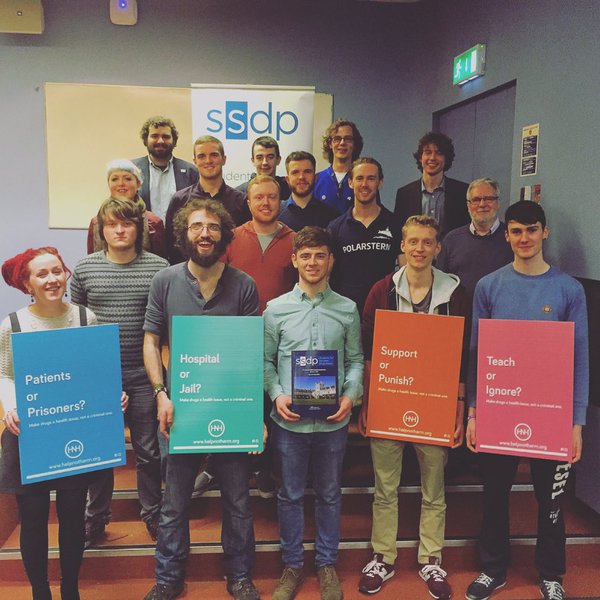
Among the speakers was Jake Agliata, USA & International Outreach Coordinator for the main branch of SSDP in Washington DC. There are currently 278 chapters worldwide in 13 different countries. He stated Ireland’s recent plan for legalised injection facilities makes the country somewhat of a model for progressive drug legislation in Europe, behind the likes of Portugal, whose decriminalisation policy provides inspiration for a similar harm-reduction structure proposed by the Oireachtas Justice Committee.
Agliata urged students to participate in the upcoming election in order to influence policy: “Vote for candidates that are going to continue this trend of sensible drug policy in Ireland.”
Members of the DCU, UCC and CIT societies outlined recent developments within their chapters. DCU’s Dan Kirby highlighted the referendum passed by NUIG’s Student’s Union on the legalisation of cannabis, noting that DCU had plans to hold a similar referendum. He also congratulated those present on SSDP’s invitation to speak at the Oireachtas in regard to the decriminalisation of drugs.
The SSDP society in CIT had conducted an insightful survey of 73 CIT students, revealing 38% of students had never taken substances, 62% had taken substances at some stage in their lives and 21% had consumed substances within the past week of the survey.
Of the 38% who said they had not taken drugs, 92% said that decriminalisation would not make them more likely to take drugs. Society chairman Martin Conlan stated: “The people who would be taking drugs [under decriminalisation] would be the people who were taking drugs anyway.”
In deciding to take drugs for the first time, 87% of students said that the health risks associated with the drug were more of an issue than its legality. The survey also noted that the majority of students agreed to the statement that educating people more about the effects and side effects of drugs would reduce the rate of misuse and the harms of such.
Katy McLeod of the Scottish Drugs Forum, and operations and communications director of Chill Welfare, emphasised the need for practical measures to ensure safe drug use for recreational users at events. Chill Welfare is a social enterprise set up in response to drug-related deaths at festivals and aims to promote safe usage. In her talk, she outlined the rise of new synthetic drugs imitating popular substances, such as synthetic cannabinoids and methoxetamine, a popular substitute for ketamine, an anesthetic drug used illicitly as a hallucinogen.
She also addressed the challenges to safer drug use on the nightclub circuit, where many owners turn a blind eye to drug use instead of implementing safety measures, for fear of losing their licenses due allegations of complicity.
The medicinal uses of cannabis, and the advances that have been made in treatment of illnesses including cancer, was key for Tom Curran, partner of the late “Right to Die” campaigner, Marie Fleming. Cannabis was the only thing Fleming found effective in dealing with the symptoms related to her Multiple Sclerosis, with the couple secretly growing medicinal strains of marijuana in their home for years.
Curran spoke on how the media constructs a negative image of drug users: “people’s perception [is] that everybody is abusing out there, instead of focusing on the fact it is a result of not having an effective drug policy. Psychotic episodes do happen, but only in case where the person is predisposed.”
Tim Bingham, National Lead Trainer for the Naloxone demonstration project, HSE Addiction Service, was able to highlight the innovative new scheme for dealing with the rise of overdoses related to heroin and opioid use.
Naloxone is a synthetic drug that is administered to opioid users in the case of an overdose, sustaining the subject for long enough until an ambulance arrives. In response to the realisation that 40% of users die in the company of others, Naloxone kits and training have been given to family members and hostel workers to prevent such instances repeating themselves.
Research from the LSE IDEAS international drug policy project has shown that prohibitionist drug policies have largely failed, and have caused collateral damage in terms of human rights abuses and socioeconomic consequences.
Dan Kirby, Chairman of the DCU chapter of SSDP, commented on the recent death of Alex Ryan, after consuming what he believed to be 2 – TBC, but which in fact turned out to be another synthetic hallucinogen, nicknamed “N-bomb.”
Kirby stated: “It really brings to the forefront what we’re trying to do.. there’s a real human element. It’s nice to talk about statistics but when you actually see something like this and you know it could have been one of your friends .. it could have been anyone, that we really want to enact something that would bring some sort of reduction and we want to stop tragedies like this happening.”






